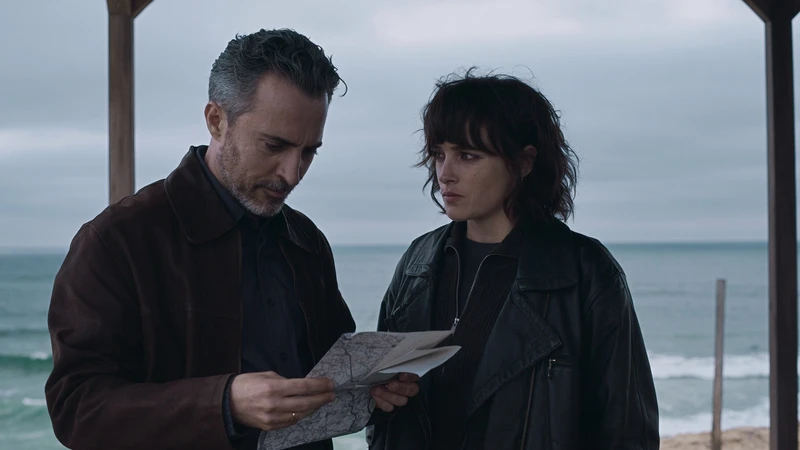Tense thrillers about the bloody exploits of the Basque separatist terror group ETA have become something of a niche genre in contemporary Spanish cinema, inspiring box-office hits like Arantxa Echevarría’s recent award-winner Undercover (2024). Similar in tone and premise, She Walks in Darkness is a slick, gripping, stylish effort from writer-director Agustín Díaz Yanes. Loosely inspired by real people and events, it focuses on a female police officer who infiltrates the group in the 1990s and 2000s, living under an alias, ultimately helping to disarm and dismantle it.
As a fast-paced, action-packed story rooted in recent history, She Walks in Darkness is a hard to fault. But as an insight into the explosive cultural fault lines running through Spanish politics, it feels slight and evasive, a missed opportunity for viewers who prefer their pulse-racing crime stories with a bit of intellectual hinterland.
San Sebastián film festival has proved the perfect setting for this week’s out-of-competition world premiere of She Walks in Darkness, since much of the action takes place in the Basque coastal town. The fact that one of its producers, feted film-maker JA Bayona, is head of the festival’s jury may be pure coincidence. In fairness, this is a solidly entertaining exercise in suspense, and could well do brisk business at the Spanish box office, much like Undercover did last year, during its short domestic theatrical run next week ahead of its streaming launch on Netflix from October 17.
An acronym for Euskadi Ta Askatasuna, meaning “Basque homeland and freedom”, ETA were active between 1959 and 2018. Initially a pacifist resistance group against the repressive Franco regime, they later evolved into a paramilitary organisation motivated by an explosive cocktail of Catholicism, nationalism and revolutionary Marxism. After adopting armed struggle as a strategy in 1968, the group began a sustained campaign of assassinations, abductions and bombings, killing over 800 people and injuring more than 22,000.
She Walks in Darkness takes place during ETA’s stormy later years, when large demonstrations were held across Spain protesting against their bloody atrocities, and public support was plummeting even in the Basque region. Susana Abaitua plays Amaia, a Civil Guard officer recruited by her boss (Andrés Gertrúdix) to go deep undercover as a schoolteacher in San Sebastian, with the aim of being recruited into a terrorist cell.
With meticulous caution, Amaia slowly breaks through the group’s thick walls of secrecy, eventually becoming a minor foot soldier, but she remains under constant surveillance and suspicion. One false move, one small chink in her cover story, could mean certain death. Which makes for a powerfully tense atmosphere, reinforced by Yanes and cinematographer Paco Femenía painting the Basque region as a purgatorial realm of tobacco-stained gloom and perpetual rainfall.
The epidemic of militant leftist groups who terrorised late 20th century Europe, peaking in the 1970s and 1980s, has inspired some fine cinematic reassessments in recent years including The Baader Meinhof Complex (2080), Mesrine (2008) and Carlos (2010). While She Walks in Darkness is as gripping as any of these, it lacks their nuanced depth. Yanes seems strangely disinterested in the social, political and psychological forces that give birth to ETA. Aside from a few brief explanatory captions that bookend the film, historical context is very thin. The clandestine committee pulling the group’s strings are fleetingly glimpsed in meetings, hushed and monosyllabic, with no insight into their tactical decisions and broader political goals.
Yanes recreates the real murders of several ETA targets: a university professor, various politicians, police officers and more, but all in brisk snapshots with almost zero curiosity about why they were killed. The interior lives of the police characters are almost as thinly detailed. Amaia initially has a secret lover/husband, but he disappears midway through the film without further explanation. At one point, her police handler is accused of torturing terrorist suspects in jail, an intriguing based-on-reality subplot which also goes nowhere.
Jumping between northern Spain and southern France, where many of the ETA leadership lived in hiding, She Walks in Darkness is a consistently nerve-jangling, nail-biting ride. Yanes stages graphic violence with unsensational flair, while Abaitua is a beautiful and alert presence on screen, investing Amaia with compelling intensity despite her underwritten character. The colourful supporting cast includes veteran film-maker Jaime Chávarri in a supporting role, a nod for Spanish cult cinema fans. The director also appears in meta-fictional documentary The Last Rapture, another San Sebastián premiere this year.
While there is much to enjoy here, anyone unfamiliar with Spanish political history will be obliged to fill in the blanks with their own research, particularly younger and non-native viewers. A minor flaw perhaps, but it makes She Walks in Darkness a more conventional, less educational and ultimately less valuable film than it might have been.
Director, screenwriter: Agustín Díaz Yanes
Cast: Susana Abaitua, Andrés Gertrúdix, Iraia Elias, Raúl Arévalo, Ariadna Gil
Cinematography: Paco Femenía
Editing: Bernat Vilaplana
Music: Arnau Bataller
Producers: Belén Atienza, Sandra Hermida, Juan Antonio Bayona
Production company: Basoilarraren Filmak (Spain)
Venue: San Sebastián International Film Festival (official selection)
In Basque, Spanish, French
105 minutes



